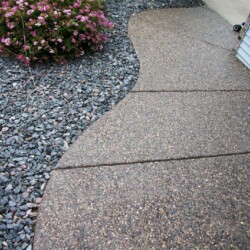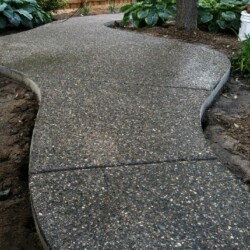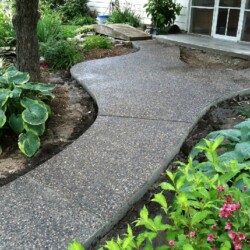What is exposed aggregate?
Exposed aggregate is a alternative to stamping for decorative concrete. It is produced by washing away the surface layer of the concrete to expose the decorative rock underneath. Exposed aggregate is a populate option over other “decorative” concrete styles as it’s universal for matching landscapes and gardens.
What is exposed aggregate?
Exposed aggregate is a alternative to stamping for decorative concrete. It is produced by washing away the surface layer of the concrete to expose the decorative rock underneath. Exposed aggregate is a populate option over other “decorative” concrete styles as it’s universal for matching landscapes and gardens.
PROS AND CONS
High Surface Traction
Exposed aggregate provides excellent traction and is an sound choice for outdoor areas, walkways, pool decks, or driveways when safety is a concern. The exposed aggregate pattern, however, may be uncomfortable for barefoot use depending on the selected options for the size and type of aggregate.
Durability
The irregular design of exposed aggregate can minimize the impact of wear and surface cracks over time compared to a smooth, polished, stenciled, or painted finish. Exposed aggregate can also be sealed to further improve durability, enhance appearance, and extend the lifespan of your concrete to decades.
Affordability
With the improved durability of exposed aggregate, you can expect to spend less on maintenance costs over time. Additionally, exposed aggregate can have a lower up-front cost than other decorative concrete finishing options.
Natural Appearance
The rough and natural appearance of exposed aggregate makes it a popular design choice for landscapes, garden areas, or parks. Additionally, the surface finish blends better than other finishing options when it comes to dirt or grime in environments where low maintainence is desirable.
Repair and Maintanence
Exposed aggregate can provide a non-traditional appearance similar to pavers while offering far superior weed control and stability. When properly sealed every two years, the surface will also be resistant to staining and water damage. The irregular surface finish may also hide repairs to age related defects like cracks more effectively than a smooth or polished finish.








